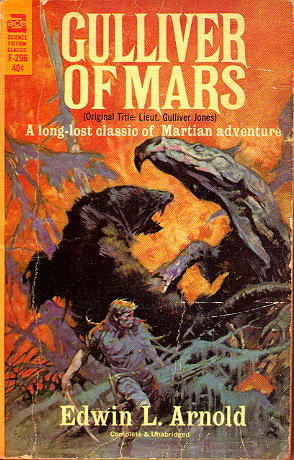Chapter IX — Gulliver of Mars
byChapter IX opens with the protagonist stepping into an alien wilderness shaped by murky lagoons, gnarled roots, and dense vegetation clinging to the edge of low, marshy islands. He finds no immediate signs of life, only the silence broken occasionally by the faint rustling of the underbrush. As dusk slips in, the forest’s shadows stretch wider, and the air becomes thick with unseen movement and ominous cries. Seeking a semblance of safety, he settles under a tree, trying to rest though each snap of a twig or stir of a leaf sends his imagination reeling. The solitude cuts deeper than fear; it makes the strange land feel even more unwelcoming. Yet beneath that fear lies a persistent drive—the memory of Heru and the obligation he carries. His exhaustion becomes a quiet companion, whispering that dawn may offer either new threats or much-needed direction.
During the night, heavy thuds echo nearby, making the ground beneath him vibrate. Whatever stalks the darkness is far larger than anything he has encountered before. The creature’s approach is slow and deliberate, suggesting awareness of his presence. Soon, another beast announces itself, not with a roar but with matching footsteps, and the two collide in a violent clash hidden by night. The sounds of tearing, shrieking, and crashing branches dominate the air, freezing him in place. What follows is a grim and primal battle, the victor left to devour the loser in a slow, grotesque ritual. He listens, helpless and transfixed, until the silence that follows is almost more disturbing than the fight itself. At no point does he dare move, hoping invisibility will shield him until morning.
By daylight, the scene is deceptively serene. The marsh glistens under the morning light, betraying no signs of the previous night’s horror. His hunger gnaws at him, and without provisions, the need to find food becomes urgent. Noticing a distant wisp of smoke curling upward from behind a cluster of trees, he walks toward it with caution. There, he encounters a young woman sitting by the water’s edge, calmly cleaning her catch. She mistakes him for a spirit, reacting with awe and slight fear until he speaks. His explanation of his journey and condition wins her trust, and she shares her food—small roasted fish—and local knowledge in return.
Their exchange offers a brief reprieve from fear and uncertainty. She explains that others dwell nearby in a village not far upriver, reachable if he follows a shaded trail along the waterline. With gratitude and restored clarity, he absorbs every detail she provides, knowing that his time in this perilous region must be brief. The woman’s hospitality, though offered in modest form, is as valuable as any weapon or map. Her assistance reawakens his sense of purpose, pushing aside the unease from the night before. It reminds him that even in alien places, acts of kindness still persist. The reassurance strengthens his resolve and helps him mentally prepare for what lies ahead.
As he departs, he reflects on how quickly desperation can be lightened by a shared meal and kind word. The Martian landscape, while frightening, is not without moments of grace. That realization deepens his appreciation for the journey, even as it grows more dangerous. Walking away from the marsh and its monsters, he does not look back. What matters now is the path forward, the face of Heru still etched in his mind. Survival is no longer just about endurance—it has become a mission fueled by loyalty and conviction. The next village may hold allies or traps, but he will greet it with open eyes and steady feet, hardened by the night’s terrors and humbled by a stranger’s generosity.

